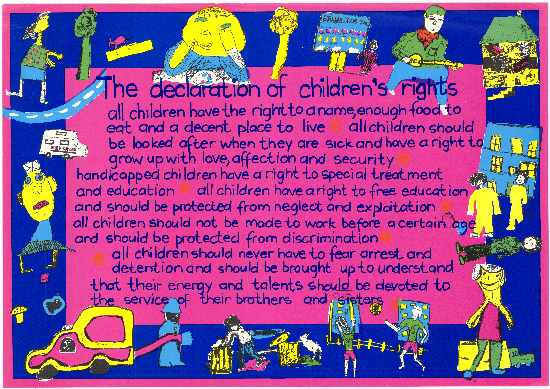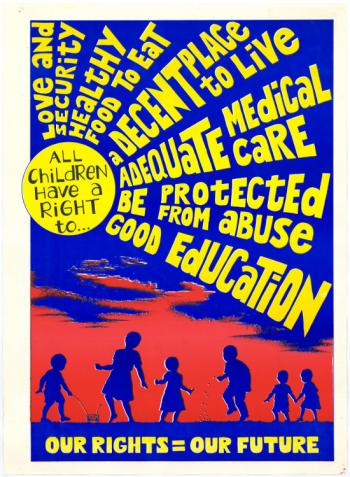International Children's Day is unique because its particular focus is on children from underdeveloped countries, affected by sustained socio-economic instability, violence and war. The date was selected at the World Conference for the Well-being of Children held in Geneva, Switzerland in 1925. It is officially celebrated in over thirty countries worldwide, including former and current Communist and Socialist countries, including Russia, Germany, Poland, Romania, Serbia, Yemen and Serbia. The day resonates with issues affecting South Africa's children, who are affected by institutionalized poverty, HIV/AIDS, and physical, emotional and sexual abuse. Studies have shown that "the impact of abuse on children tends to cause life-long damage and affects their growth and development into adulthood."
- 'The impact of abuse on children', AL2605_NISAA: Journal of the Institute for Women's Development, Volume 2, September, 1996

During apartheid, particularly after the 1976 uprisings stimulated more organised and integrated youth resistance,
"...the indiscriminate and ruthless nature of the use of force to suppress protest in the townships of South Africa... led to the injury and sometimes death... of residents who happen(ed) to be in the area of state action...."
- 'Apartheid's violence against children', SAHA, AL2595 :: International Conference on Children, Repression and the Law in Apartheid South Africa
The Declaration of the Rights of Child, proclaimed at a meeting of the United Nations General Assembly on 20 November, 1959, presented a series of principles for the wellbeing of every child. In a 1987 paper, Kader Asmal argued that the Declaration was one of a "succession of instruments" that emphasised
"the concept that children, as a result of their particular vulnerability, should be granted special rights."
- 'Rights of Children under International Law', Kader Asmal, AL2595: International Conference on Children, Repression and the Law in Apartheid South Africa
Asmal saw the most "significant" of these instruments being the Draft Convention of the Child, which was later signed on 20 November, 1989. The Convention was subsequently ratified by 191 states, setting a minimum standard for the specific human rights of children. Many local and international organisations continue to work towards improving the conditions of children in South Africa. One of these bodies is the Children of South Africa (CHOSA), a US-based organisation that identifies and supports community-based organisations (CBOs) committed to taking care of orphans and other vulnerable children in South Africa.

Please visit CHOSA to learn more about its work.
SAHA Collections and children's rights
AL2595: The International Conference on Children, Repression and the Law in Apartheid South Africa Collection
The International Conference on Children, Repression and the Law in Apartheid South Africa was held in Harare, Zimbabwe, from 24-27 September 1987, under the auspices of the Bishop Ambrose Reeves Trust, and was convened by the Rt. Revd. Trevor Huddleston. According to a press release stored in this collection, "hundreds of international experts, politicians, liberation movement officials, trade unionists, journalists and religious leaders from all over the world" were to gather to "expose the full extent" of the problems facing children in South Africa, to achieve an understanding of their difficulties and focus international attention on the crisis confronting the youth.
AL2605: The NISAA Institute for Women's Development Collection
The NISAA Institute was founded in 1994 as a community-based women's organisation. The Institute is involved in networking, in providing refuge for female survivors of violence and their children, in lobbying for legislation that protect women, and in creating opportunities for women's entrepreneurial development. It is opposed to all forms of oppression, violence and exploitation against women and is committed to non-sectarianism and social transformation.








